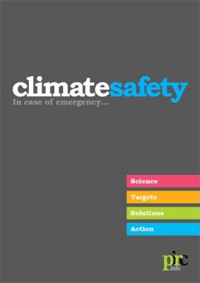 Tomorrow a new and updated version of last year's climate report, Climate Code Red, will be released. The Climate Safety report from the Public Interest Research Center (PIRC), an independent charity studying and communicating vital global issues in the UK, is expected to trash the out-dated climate predictions from the IPCC, and show that the climate doesn't change little by little but instead in a landslide.
Tomorrow a new and updated version of last year's climate report, Climate Code Red, will be released. The Climate Safety report from the Public Interest Research Center (PIRC), an independent charity studying and communicating vital global issues in the UK, is expected to trash the out-dated climate predictions from the IPCC, and show that the climate doesn't change little by little but instead in a landslide.
The new report is said to show that we can’t afford to follow Brown's or Obama's climate plans, which both calls for an 80% reduction in global emissions. Instead global emissions must decline by between 6-8% per year from 2020 to 2040, and lead up to a complete 100% decarbonisation by 2050, according to a paper by the Tyndall Centre for Climate Change Research.
And if we are to keep global temperatures from reaching a 2 degree increase we need to cut global emissions by even more than 8% a year. So there is no point anymore in arguing about any percentage as everything has to go, and the sooner the better.
Some people have already read the new Climate Safety report. George Monbiot is one of them, and he says that "you cannot overstate the importance of this report: it has opened my eyes to levels of climate risk far beyond those of which I was aware. Crisp, clear-headed and profoundly shocking, this report should be read immediately by everyone who cares."
And Mark Lynas, author of "Six Degrees", says that "Climate Safety plainly shows us that we need to inject a sense of urgency into the debate about how we respond to climate change. It’s not about gradually reducing emissions any more, it’s about recognising the risks we face and cutting our emissions to zero as quickly as possible."
Climate Safety is "a report to keep every policy maker awake at night," Caroline Lucas, leader of the Green Party in the UK, have said. Let's hope she is right.

Recommended Comments
Join the conversation
You can post now and register later. If you have an account, sign in now to post with your account.